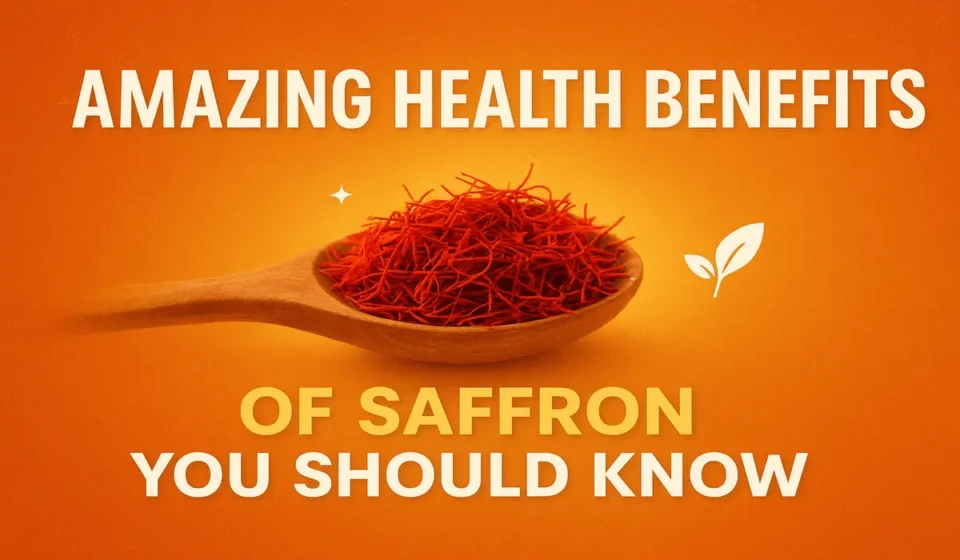Saffron: The Golden Spice of Health and Wellness 🌸✨
Saffron, often called kesar in India, is one of the most treasured spices in the world. Those delicate red threads are not only prized for their flavor and fragrance but also for their powerful health benefits. For centuries, saffron has been a part of Ayurveda, traditional medicine, and beauty rituals, earning the title “the golden spice.”
But what makes saffron so special—and so expensive? And how can just a pinch of it support your health? Let’s explore its history, benefits, and easy ways to add it to your daily life.
Why is Saffron So Valuable? 💛
Saffron is actually the most costly spice in the world. A single pound (about 450 g) can cost anywhere from $500 to $5,000!
The reason? Harvesting saffron is extremely labor-intensive. It comes from the flower Crocus sativus. Each flower produces only 3 tiny red stigmas, which must be handpicked and carefully dried. It takes about 75,000 flowers to make just one pound of saffron—no wonder it’s so rare and precious.
Despite its cost, saffron has been treasured for more than 4,000 years for its culinary, medicinal, and spiritual value.
11 Amazing Health Benefits of Saffron 🌿
1. Rich in Powerful Antioxidants
Saffron is full of natural compounds that fight oxidative stress and protect your cells.
Crocin & Crocetin – Support brain health and reduce inflammation.
Safranal – Gives saffron its aroma and may help with mood balance.
Picrocrocin – Adds its slightly bitter taste and health-protective qualities.
Kaempferol – Boosts immunity and fights viral infections.
Antioxidants are your body’s natural defense against aging and chronic diseases.
2. Lifts Mood and May Help with Depression 🌞
Saffron is frequently called the “sunshine spice” because it brightens mood. Research shows it may naturally increase serotonin levels, helping reduce mild to moderate depression and anxiety symptoms.
✨ Just a pinch in milk, tea, or food could give you a natural emotional lift.
3. May Help Protect Against Cancer
Antioxidants in saffron may stop the growth of harmful cells and support healthy ones. Studies suggest saffron compounds could help slow down cancers like breast, prostate, and lung cancer.
⚠️ Important: More research is needed. Saffron should not be considered a treatment—always consult your doctor.
4. Eases PMS and Period Discomfort 🌸
For women, saffron may help reduce common PMS symptoms such as mood swings, cramps, and irritability. Drinking warm saffron milk or taking supplements (with medical advice) can offer relief.
5. Acts as a Natural Aphrodisiac 💕
Traditionally, saffron has been used to enhance intimacy and sexual wellness. Modern studies also suggest it may improve desire and performance, especially in people on antidepressants.
6. Supports Weight Management ⚖️
Struggling with food cravings? Saffron may help reduce emotional snacking and overeating. Some studies show it can act as a natural appetite suppressant—making weight management easier when combined with exercise and a balanced diet.
7. Good for Heart Health ❤️
Saffron may lower LDL (bad cholesterol), triglycerides, and blood pressure. This helps improve blood circulation and keeps your arteries clear, lowering the risk of heart disease.
8. Helps Regulate Blood Sugar 🌿
Crocin in saffron supports better insulin sensitivity and may help balance blood sugar levels. It also protects the pancreas from oxidative stress, which is vital for people with diabetes or prediabetes.
9. Protects Eye Health 👀
Age-related macular degeneration (AMD) is a major cause of vision loss in older adults. Studies show saffron may improve retinal function and slow down vision decline thanks to its antioxidants.
10. Boosts Memory and Brain Function 🧠
Research indicates saffron extract may support memory in people with Alzheimer’s disease. Its compounds help reduce brain inflammation and protect neurons, improving focus and cognition.
11. Easy to Add to Your Diet 🍵
The best part? Using saffron is simple!
Soak 2–3 strands in warm milk or water and add it to tea, rice, or desserts.
Use it in traditional drinks like kesar doodh or kahwa.
Supplements are also available—but always consult a doctor first.
Safety and Precautions ⚠️
Use saffron in small amounts (2–5 strands a day is enough).
Too much saffron (over 5 grams at once) can be toxic.
Pregnant women’s should consult a doctor before consuming saffron.
Final Thoughts 🌟
Saffron isn’t just a spice—it’s a golden gift of nature. From uplifting your mood to supporting heart, brain, and skin health, it truly lives up to its reputation. Even though it’s costly, just a tiny pinch daily can bring powerful health benefits.
If you’re looking for a natural way to add wellness and flavor to your life, saffron might be the treasure you need.

